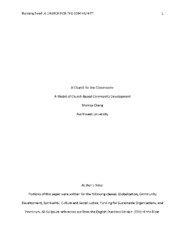| dc.contributor.author | Cheng, Monica | en |
| dc.date.accessioned | 2017-08-02T16:39:33Z | |
| dc.date.available | 2017-08-02T16:39:33Z | |
| dc.date.issued | 2015 | en |
| dc.identifier.uri | archives.northwestu.edu/handle/nu/25161 | |
| dc.description.abstract | Within our globalized society, churches have unique roles to play as agents of social change. In the context of the author's fieldwork in South Africa, this thesis investigates the idea that God calls His Church—as His representatives—to engage in long-term social action to alleviate poverty and bring about transformative change in communities. I begin with definitions of poverty, community development, and "the Church". These definitions are followed by an exploration of Biblical reasons for engaging with social change, an examination of current best practices for carrying out such engagement, and a survey of examples from the academic literature of contemporary church engagement. Next, a case study of a church in the Cape Town suburb of Delft will be presented, followed by a model of church-based community development (consisting of 10 principles) drawn from the case study. This paper will demonstrate that local churches, as God's gathered people within a community, are called to seek the welfare of their communities. By engaging in holistic efforts to alleviate poverty in local and global settings, they can become conduits for transformational community development. | en |
| dc.description.tableofcontents | A church for the community: a model of church-based community development -- Defining poverty and community development. Conceptualizing poverty; Defining community development -- Foundational principles: the church and community development. What is "the Church"?: The universal Church and local churches; Examples of church engagement from the literature -- Case study of Delft, Cape Town, South Africa. Profile: Cape Town and Delft; Zoe Family Church; Zoe Incubation Centre (formerly Zoe Academy of Skills) -- Towards a new model of church-based community development. Church engagement in community development: a model from Delft; What inhibits community development?: the commuter church phenomenon; Summary: Principles for church-based and holistic development -- Conclusion | en |
| dc.format.extent | 69 pages | en |
| dc.format.medium | DOCX | en |
| dc.language.iso | en | en |
| dc.publisher | Northwest University | en |
| dc.rights | This original work is protected by copyright. Copyright is retained by the author(s). Works may be viewed, downloaded, or printed, but not reproduced or distributed without author(s) permission. | en |
| dc.rights.uri | http://archives.northwestu.edu/page/copyright | en |
| dc.subject | Church and social problems | en |
| dc.subject | Poverty | en |
| dc.subject | Community development | en |
| dc.subject | South Africa | en |
| dc.title | A Church for the Community: a Model of Church-Based Community Development | en |
| thesis.degree.name | Master of Arts in International Care and Community Development | en |
| thesis.degree.level | Masters | en |
| thesis.degree.grantor | Northwest University | en |
| thesis.degree.discipline | College of Social and Behavioral Sciences | en |


 Maintained by the Northwest University Library
Maintained by the Northwest University Library